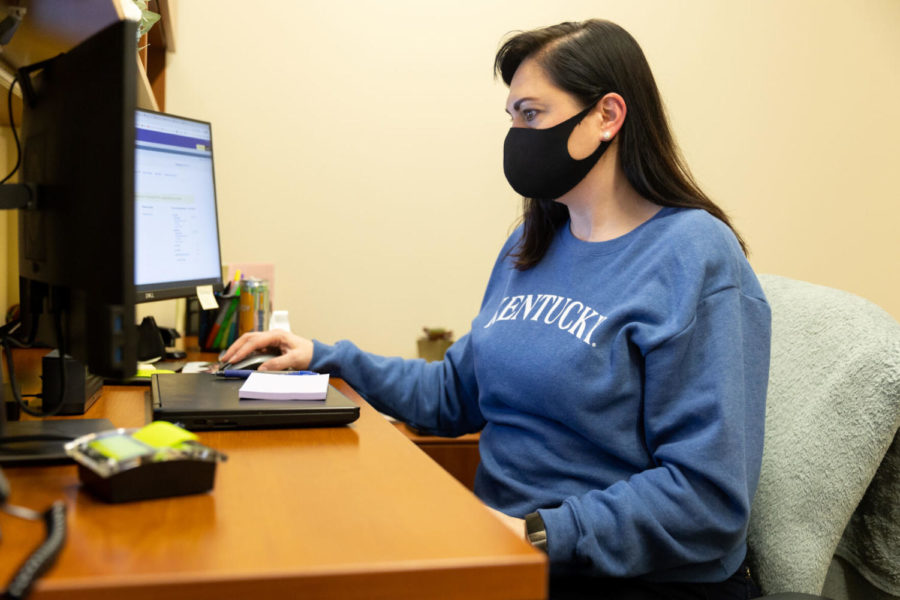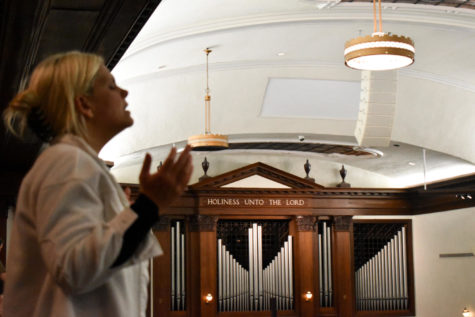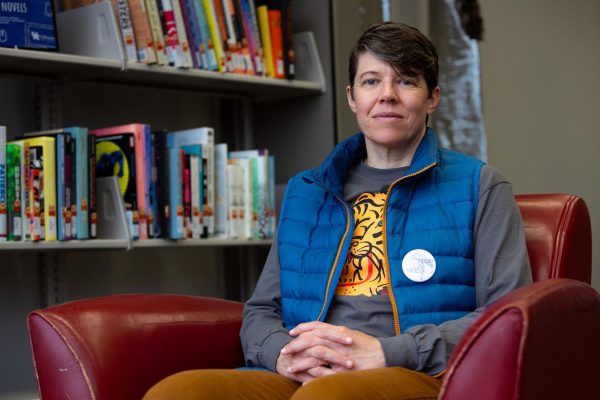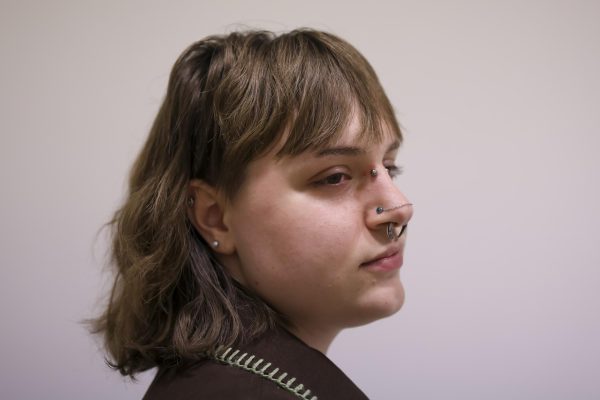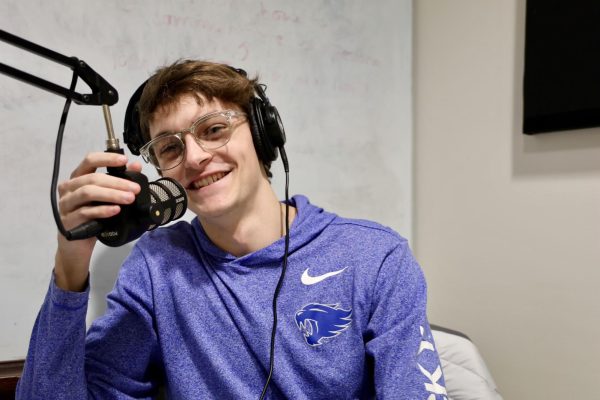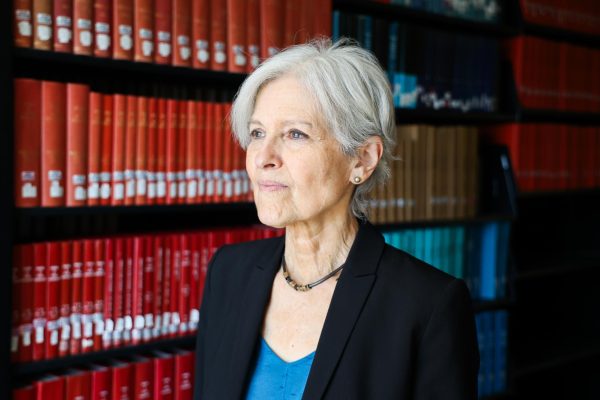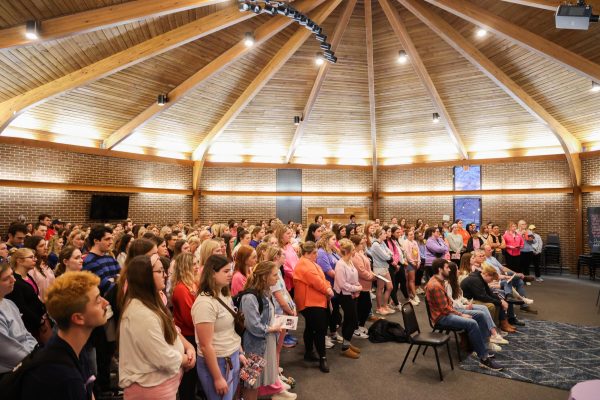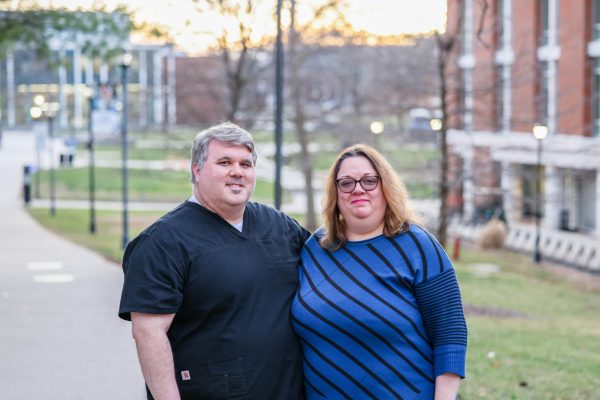Important or unnecessary: A look at advising appointments
Tricia Henry, an academic advisor in the Gatton College of Business, works in her office on Tuesday, Feb. 22, 2022, at the University of Kentucky in Lexington, Kentucky. Photo by Jack Weaver | Staff
February 22, 2022
Once a semester, every student gets an advising hold on their account, which requires them to meet with their adviser before they can schedule their classes for the following semester.
For some students, this meeting is helpful, and they actually talk to their adviser frequently. Others consider it unnecessary and only speak with their adviser when it is required. Carly Jones, a sophomore communication major, finds herself right in the middle of the spectrum. Jones said that she communicates with her adviser fairly often outside of the mandatory meetings to get her hold lifted.
“I meet with my adviser about two times a year, but I email him whenever I have questions, and he’s quick to respond,” she said.
Jill Stowe, a research and teaching professor in the Department of Agricultural Economics, said she does not usually communicate with her advisees outside of the required registration meetings. However, she appreciates that “that door can be opened easily.”
“Getting to know the students outside of the classroom is probably one of the best things, and I think the way that our department and probably our college do academic advising helps the students feel like they have a little bit more of a family on campus,” she said.
Sophomore equine science major Michael Ciccolella said he finds meetings with his adviser to be helpful. He meets with this adviser once or twice a semester to discuss his future classes as he works towards his degree in equine science and management. He said that his adviser is one of his professors, as well as his coach on the University of Kentucky Western Team, so he has more opportunities to check in with him.
His advisor, Dr. Bob Coleman, is an associate professor in the College of Agriculture, Food and Environment’s Equine Programs department. He said his goal as an advisor is to direct students to required courses and potential careers. Coleman specifically brought up the variety of elective courses offered in the Equine Science and Management program; his job is to make sure that students choose courses that align with both their degrees and their goals.
The effects of these goals can be seen in Heath Maynard, a senior economics major. Maynard said he finds the meetings with his adviser to be beneficial. He has only ever met with his adviser when he needed to schedule his classes, but he still thinks that the meetings are useful.
“We usually talk about the classes I have to take and what other steps I need to do next in order to graduate,” he said.
For other students, though, this is not the case. Junior accounting major Cooper Johnson said he only meets with his adviser when he has to.
“The only reason I meet with them is to get my hold lifted. I just kind of already know what classes I need to take from previous appointments,” Johnson said.
Though advising holds can be annoying to some students, especially those who already have a solid idea of what their future schedules will look like, Coleman said these holds and the subsequent required advising appointments are “a must.”
“There needs to be a conversation to make sure the plan is going the way it needs to and things don’t get left out. Nothing worse than getting to the end and being a credit hour short,” he said.
How many students an adviser mentors depends on the size of their college. Some small programs, like Agricultural Economics, have about 20 faculty members, who all advise the program’s approximately 160 students. Other advisors, like Miller, can have between 250 and 300 students assigned to him at one time.
These large advisee volumes can make it difficult for some advisers to achieve the connections with students they strive for. Trey Morris, a junior mechanical engineering major, said the advising system has made it difficult for him and his advisor to establish a relationship.
“My adviser, in particular, seems to have a large number of students assigned to him and seems uninterested in my specific circumstances,” Morris said. “My degree path is pretty intuitive anyway, so it doesn’t make much of a difference.”
Haley Kallberg, a junior in the communication sciences and disorders undergraduate program, said that she has difficulty meeting with her adviser because they have such a busy schedule.
“I have to book my appointments months in advance, which means I have unanswered questions for a long time,” Kallberg said. “I email her if it is something that I need to be answered quickly, but I would rather be able to meet with her virtually or in-person more frequently.”
However, a busy schedule does not necessarily mean that advisers do not maintain contact with students. Andrew Fast, for example, advises students in several departments such as biology, psychology and neuroscience. While this seems like a heavy load that individual students could get lost in, Fast still maintains an “open and friendly” rapport with his advisees.
“I just had a student for an hour today, and since I didn’t have a back to back, he just stayed in, had a little water, and just kind of like, decompressed some things, and we looked at two semesters out,” Fast said. “Me personally, if they have the time and they want to go more than just like, what do you need now for summer [and] fall? I’m all about, like, yeah, let’s look at everything down the road.”
Chris Miller, an academic advisor in the College of Arts and Sciences, said that having a large number of advisees makes it harder to maintain relationships with students. However, he said that he himself has never encountered this difficulty. He said he tries to maintain as much contact as possible with his students from the moment they enter campus.
“We really try and get them in for some type of freshman or first semester advising appointment where we could just get to know them, where they’re from, why they chose their major, what are their career goals, what do they want to do before they graduate,” he said. “After that, at a minimum, we’re going to be seeing them at least once a semester for priority registration, but advisors regularly contact our students by email … so that students are more comfortable reaching out back to us if they have questions.”
Despite the difficulties she has encountered, Kallberg thinks that the meetings are helpful. She said that she discusses her current classes with her adviser and plans out her future classes. They also talk about graduate school applications and requirements to plan out her future after leaving UK.
Coleman said he discusses both classes and life goals with his students. He also emphasized that building relationships between students and advisors is a two-way street.
“If you are just helping pick courses, that is not much advising for the student,” he said. “To be a good advisor, you need to manage your time and set your schedule so it is effective for all. That said, students need to be engaged in the process and book appointments in reasonable time and not leave it to the last minute.”
Miller said that a student’s connection to their adviser depends on what they need from their college career. Some students are very self-sufficient, he said, while others have second majors, minors, study abroad programs and internships that they cannot juggle by themselves.
“The university is such a large place and has so many policies and so many opportunities; it’s really difficult for even a very successful student to be aware of all of the opportunities and things out there that they might be able to take advantage of,” he said. “I’m sure there’s going to be students out there who see advising as kind of pointless, but I’m sure there’s plenty of students out there who feel like they have really good relationships with their adviser and whose adviser has really been able to help them.”









































































































































